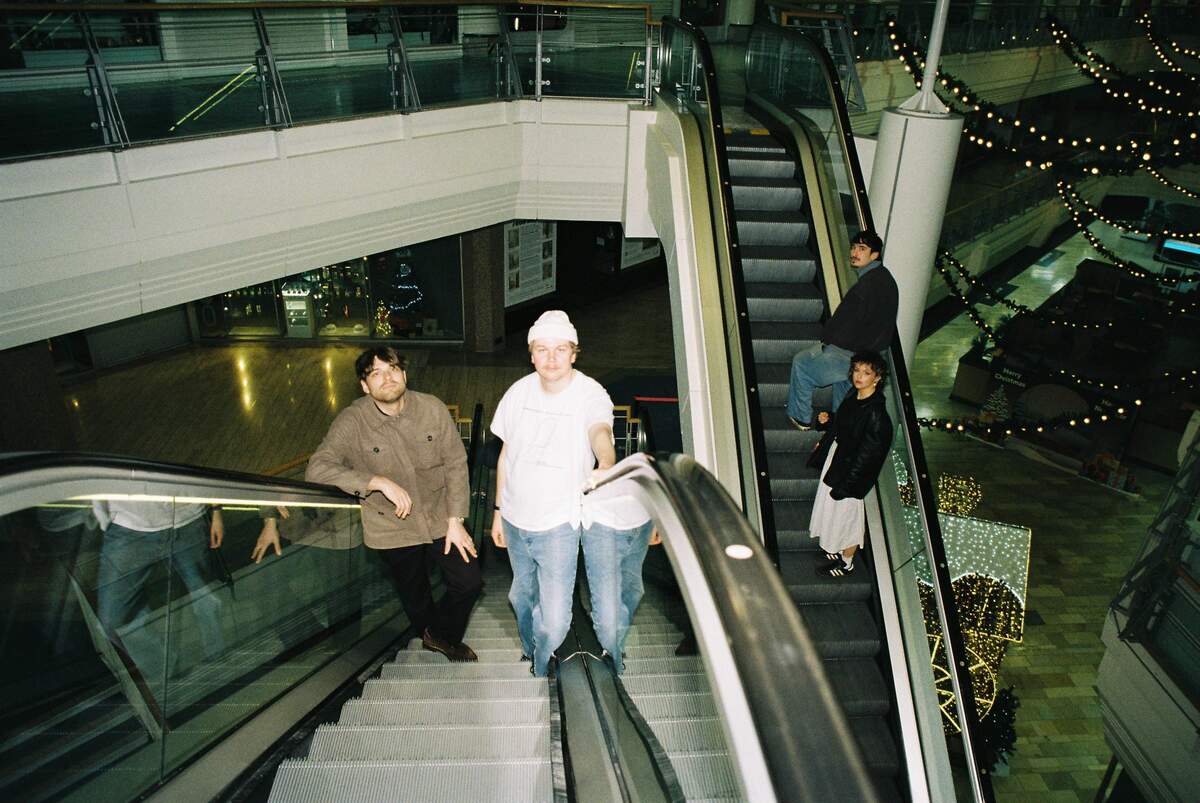Sjak van Bussel Interview | The Cassette Underground
Sjak van Bussel is a founder of legendary underground Dutch label Midas Tapes that started in the early eighties, and Supreme Tool Supplies label & mailorder from the early nineties. He was and still is a big part of Dutch DIY underground scene. A true noisemaker in bands such as The Berlin Wall, Club Rialto, THU20, Lewd, Bunkur, and in countless other solo efforts. Operating Antenne Recordshop in Tilburg is his latest occupation.
“I discovered an English radio station for the soldiers positioned in Germany and heard John Peel play The Fall for the first time and from there my interest in independent and obscure music started.”
How did you get first interested in music? What kind of music did you listen to as a young teenager?
Sjak van Bussel: My interest in music has been poured into me from a very early age. I am the 10th and youngest in a large family and almost everyone listened to (mainstream) music. So I started playing records when I was still in diapers, so to speak. I had an uncle who practically lived in a pub, and every time the jukebox in that pub was recharged, he bought up all the 7-inches and I got them as a present. When I was about 6 years old I already had a few hundred sleeveless and heavily used jukebox records, all Top 40 sixties and seventies hits. As a kid I was immediately mesmerized by The Stones and until I was 13 I only collected The Stones records.
At night I secretly listened to pirate stations in bed and in 1980 I discovered an English radio station for the soldiers positioned in Germany and heard John Peel play The Fall for the first time and from there my interest in independent and obscure music started.
Where and when did you grow up? Did the local scene have any impact on your music taste?
I grew up in a small town called Asten, at that time still 14000 inhabitants, in the south of the Netherlands. The only city in the vicinity of significance was Eindhoven 40 kilometres away. But Asten had a youth center called O.J.C. Pepijn and in the 80’s we still got a subsidy so we could just put in a programming the way we wanted it. Deurne is a nearby village with an alternative scene and youth center. So we shuttled up and down between Asten and Deurne to see good bands and meet friends.
O.J.C. Pepijn in Asten was founded in the 70’s by local hippies and misfits, run entirely by volunteers, and most performances were Blues and Rock bands, until a new generation of New Wave and Punk enthusiasts took over in the early 1980s. We had quite an extreme programming for a village of that size. And I was very active there as an organizer and bar employee since I was 15. Especially in times when few volunteers were active, we were able to do our programming with many Punk, Industrial and New Wave bands.
So actually you can say that we made a mark on the scene with a few friends in terms of music instead of the other way around. Someone had to spend the budget … Artists who are used to large cities were often very surprised by the place we had in the village that no one had ever heard of.
The only people in the village that had a big impact on my musical taste was a local Cold Wave band J’nitors United C.O.D., which in my opinion were far too undervalued. They rehearsed every week in the youth center and I was there often and got to know the group members well, which turned out to be a good basis for our friendship and later cooperation. Through them I discovered some good music, but also by listening to John Peel’s radio program.
I also often took the bus to Eindhoven, where you had a number of good record stores, you could buy good weed in local bars and concert hall Effenaar back then had sublime programming with bands such as The Birthday Party, The Fall, Swans, Sonic Youth all bands that released music on labels like Rough Trade, 4AD, Factory etc.
When did you decide that you wanted to start working and performing your own music?
As a child, I was already playing in front of the mirror with a fake guitar and dreamed that I would play in a band someday. I had a star-shaped guitar cut from plywood, like Garry Glitter had, haha.
When I was 13 I got a cheap Japanese unbranded electric guitar and then started a school band. Later I recorded all Jacinthebox tracks with that guitar. It had a razor-sharp sound, actually it was the only electric guitar I ever had.
Well, one thing leads to another ….
“The DIY atmosphere has always appealed to me”
What’s the story behind forming A-Tapes that soon became the notorious underground label Midas Tapes? What was the main reason behind it?
When I discovered underground music, I immediately went into it with great fanaticism, delivered a lot of newspapers to earn money so I could buy as many records as possible. At that time I also read various fanzines, including the Koekrand, and cassettes were often reviewed there. I decided to buy a random compilation tape and it was an instant hit. I believe it was the Ruzie cassette released by Dutch label Ruziek. And I immediately knew that I wanted to do the same. The DIY atmosphere has always appealed to me from then on.
I decided to start a cassette label under the name A-Tapes. That “A” was written as an anarchy symbol and it was also the first letter of my hometown Asten, but because after a few releases it was already clear that I was going more towards Post-Punk, Noise and Experimental Music without a specific political statement, I changed the name to Midas Tapes. Named after the local Midas shopping center.
You were part of so many projects so please excuse me if I get something wrong. The first release on Midas Tapes was a release of a Punk band The Berlin Wall. I believe you were part of the band too?
The very first cassette I released was the third in the catalog. The first and second were already planned, but the third was finished first. The first of the catalog was indeed from punk band The Berlin Wall. That was the first serious band I played in who played self composed songs only. In the end we only existed for 2 years although in my experience it seemed to take much longer. I got kicked out of school, ran away from home, experimented with anything and everything … That was a very important period for me, which in my memory lasted much longer than the couple of years it eventually were.
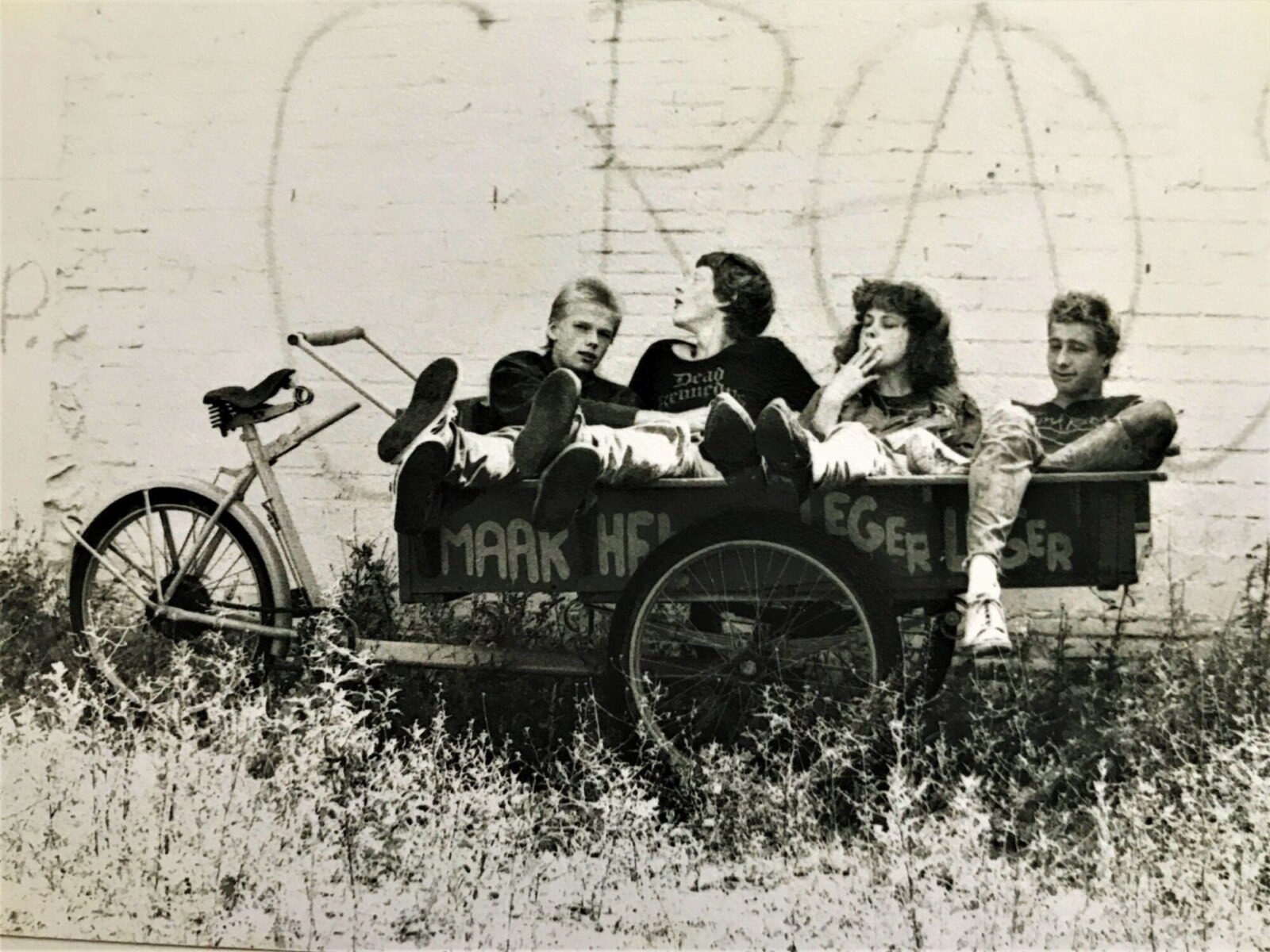
We did quite a few gigs in the area, and had a loyal group of followers. We had hardly any money so we rehearsed with vocals, bass and guitar over one amplifier and could not afford a recording studio, so unfortunately it remained with 1 cassette release and a few tracks on compilation cassettes.
I can’t remember why we actually stopped. Could be that the inspiration was gone ….
Then there were a couple of punk compilations with bands including The Fall. How did that come about?
The Fall was on the Rare Boys Die Punkers (Weird Boys Those Punks) cassette and it was the very first cassette I released. This cassette contains tracks from Bounded Sound (one of the guitarists of J’nitors United C.O.D.), rehearsal recordings from The Berlin Wall. Actually I would put live tracks from The Clefts on this tape which they promised me, but they never provided me with it so I had ripped two tracks from their 7″ and added them without permission.
Yes and I smuggled my cassette recorder in at a concert of The Fall, but the batteries were already drained when the gig started, so I could only use the first 4 songs of the gig and even those played a bit too fast. And I also recorded some simple guitar tunes on an old reel-to-reel tape recorder under the name ZRQ.
I really wanted to release a tape so bad… it turned out to be a strange mixture, but still quite nice.
What’s the story behind the Pyramid Paranoid release?
The intention was to release cassettes under that name with one-off jam sessions that I had recorded with other local friends. In the end, two cassettes were released under that name: the first was an impro session with a friend with whom I once was in a school band in the distant past, and on the other with a friend who has never touched a bass guitar before. The second cassette contains improvisation recordings that I made together with band members of J’nitors United C.O.D..
Two of the recorded tracks were used not much later in a side project by J’Nitors called Two Men Arrested. A live LP of this will be released soon with live recordings of a performance from 1983 which they did on the same night as The Berlin Wall gave their farewell concert.
You were performing under different monikers. Was the reason for different names, different kind of recorded material?
The reason is very simple: under the name Jacinthebox I made No Wave guitar noise and later under the name DMDN (Dva Met Dva Nichts) I made ambient and noise tracks with only electronics. All the other bands I played in had their own names of course.
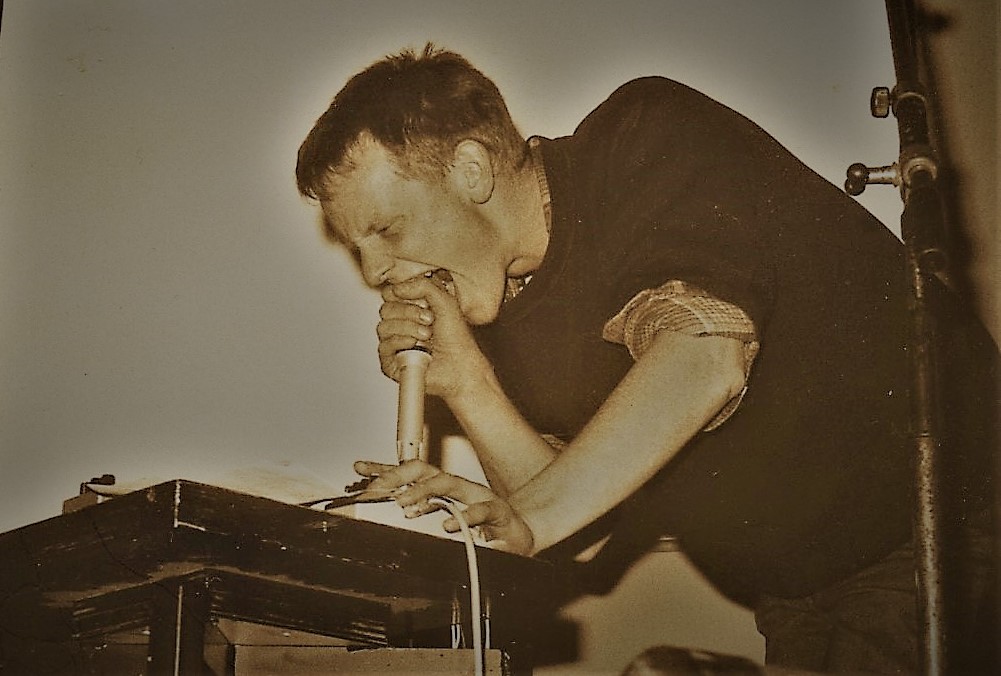
How about Club Rialto?
Club Rialto started when I became good friends with Guido Doesborg, a fellow villager. He had a cousin he got along well with and was a bass player. So then I got to know Roel Meelkop and we started making music under the name Club Rialto.
We were a Post-Punk/New Wave trio with guitar, bass, voice and drum computer.
In that period, all three of us also had a solo project. Guido was Dwarf Farm, Roel was Happy Halloween and I did Jacinthebox. Guido then lived in a squat together with Jos Smolders and he did the visuals during the Club Rialto performances.
One of the better known groups you were part of is THU20. What was the concept behind it?
One night Club Rialto was asked for a gig, but Roel was unable to participate at the last minute. Guido and I, together with our then sound engineer Peter Duimelinks and friend Jos Smolders, did an improvisation performance under the name THU20 (under that name Guido and I had already released some recordings on compilation tapes).
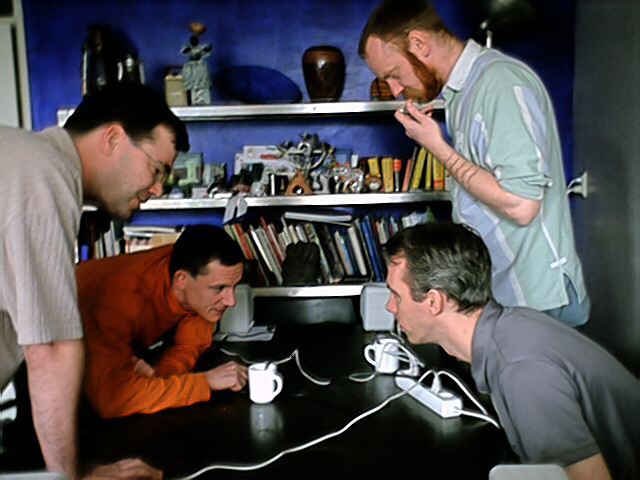
So we were forced to abandon the rock beats and turned to improvisational drones and noise. Unexpectedly, the audience was raving and THU20 continued with it and did a whole series of live performances.
Live recordings were released on tape by Midas Tapes and later it was re-released on the “Vroeg Werk” 2CD published by Monochrome Vision.
After many years Guido left, while Frans de Waard (Kapotte Muziek / Korm Plastics) got more involved, these days being the fifth member of THU20.
We didn’t really had a concept, but the strength was in the fact that some of us have a strong interest in composed and balanced electronic music and the other members are more into the plug-in and start concept. Finding a balance between those two principles made it challenging for us to work together as a collective.
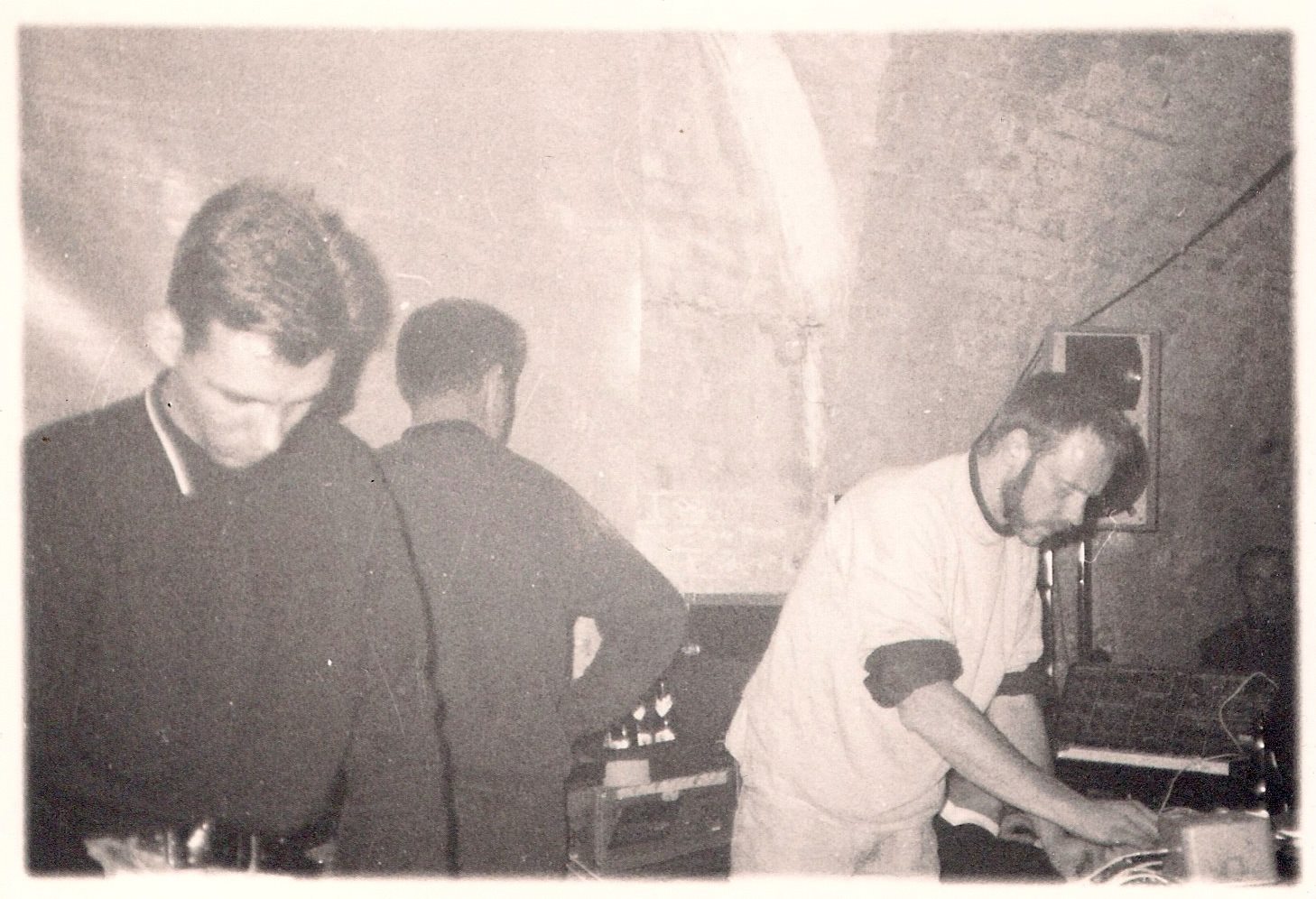
We starting out as live improv band, but from the moment we had access to a 4-track tape recorder, we also started making studio recordings in a composing way. So there is a clear difference in style between our improvised live performances and the composed pieces we record in the studio.
The studio tracks are composed on the second with every sound discussed and deliberately placed in the right place. THU20 has grown into a collective of 5 musicians, each with their own vision of sound and way of working and our studio tracks are a nice result this.
You did a split with Merzbow.
From 1987 to 1994 I worked as a volunteer at the V2 Organization in Den Bosch, the Netherlands. That was a fantastic place where often experimental and extreme art and music had a stage. Bands like Laibach, Test Department, Club Moral, The Haters, Einsturende Neubaten, Non (Boyd Rice), Vivenza, but also Merzbow and less well known Noise artists performed there. In 1989 V2 brought Merzbow to Europe for its first ever European tour and THU20 was just developing a live performance together with Gregory Whitehead (who contributed to the performance via a telephone connection). We were then also booked with THU20 for a number of concerts where Merzbow also performed. Including the DMA2 festival in Bordeaux. During that performance, due to a technical defect, no telephone connection could be made to Gregory Whitehead, and we did a noise improvisation.
I released a split live LP with our performance on one side in Bordeaux and on the other side a construction of Merzbow recordings that were recorded during his three Dutch concerts.
You formed Incubus in 1986 and changed your name to Lewd in 1990. ‘Rivet’ is a classic underground noiser. What do you recall from the sessions?
After playing in a punk band Lady Die for a year (we never released anything), Incubus was created from the remains of J’nitors United C.O.D. and Club Rialto. At some point there was an occupation change and we changed our name to Lewd because apparently there was already a well-known metal band called Incubus of which we were not aware of. It turned out that a band called The Lewd already existed. We only found out about this months later too.
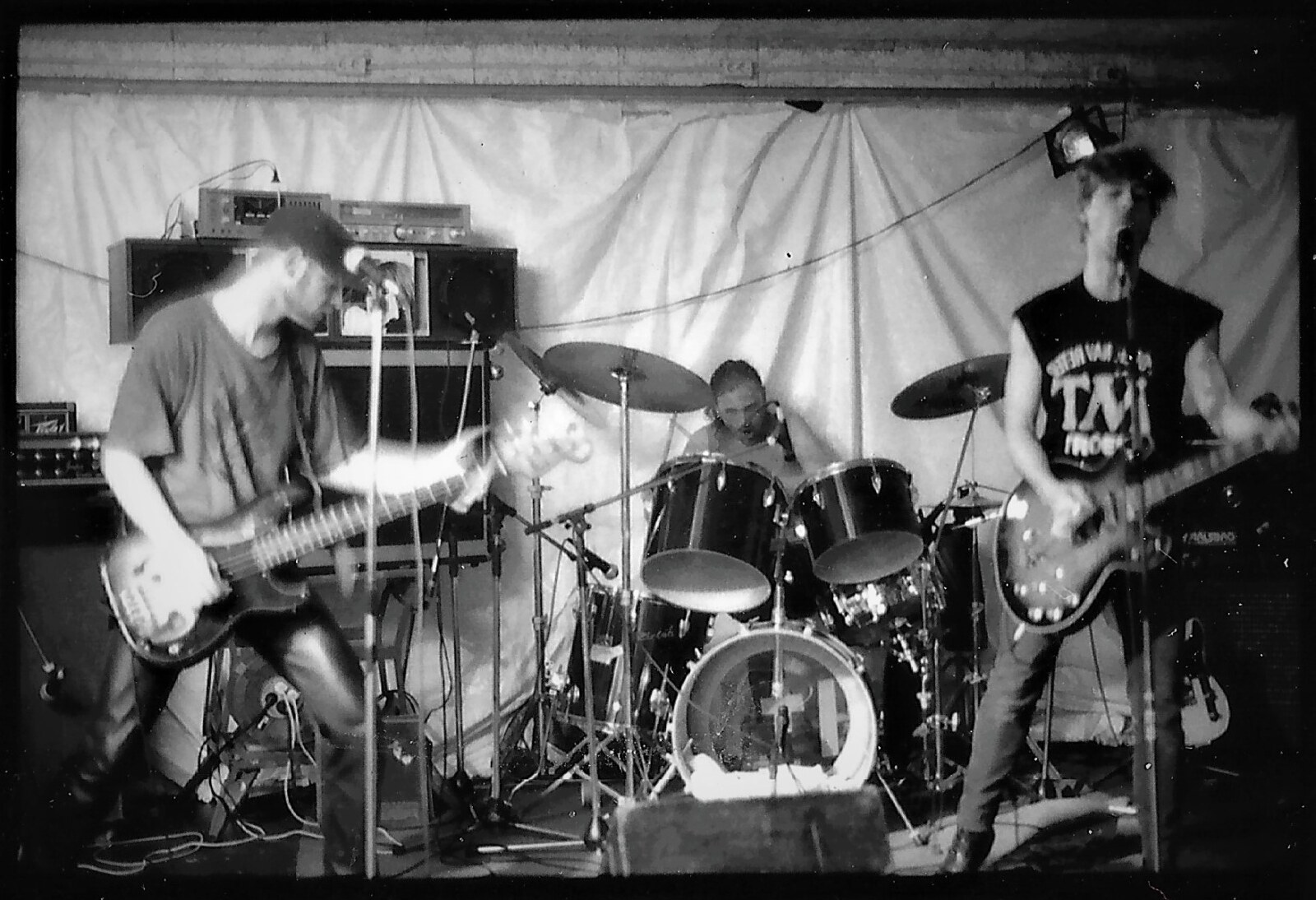
Because of the cassette scene that I had dived into, I came into contact with Kazuyuki K. Null of Zeni Geva. We started to correspond by mail and exchanged recordings. There was an instant click and I suggested releasing a split LP on my Supreme Tool Supplies label. That has come, with live recordings of both bands on both sides.
At one point I sent him two Lewd tracks that we wanted to release on a 7”. He responded very positively to this and suggested that we record a CD for his Nux Organization label. We got some studio time to record an album and then entered the studio.
I can still remember that the studio sound engineer was not really prepared for a band of this caliber and since we did not feel like playing everything at a low volume track by track, we recorded all tracks live in one go. Only the vocals were recorded afterwards.
We were a real live band where we reacted in speed and intention to each other and it is impossible to achieve that by making recordings separately.
Finding the right sound was quite difficult and the moment we mixed the last track ‘Rivet’, we knew how to go about it, but then we ran out of studio time. If we had an extra day, the result would have been even better, I think.
Are you still performing under DMDN?
At the time I was very busy rehearsing and performing with THU20 and Lewd, I was very involved with a local illegal pirate radio (Radio Banzai) and then also worked as a volunteer at the V2 Organization. I have always done DMDN in between all the activities and the only time that I was on live stage, was with Frans de Waard under the name of Death Pact. I don’t remember exactly how many times we performed, but I think that was about 6 or 7 times. Live recordings of this have been released on various compilation cassettes under the name DMDN / PDM.
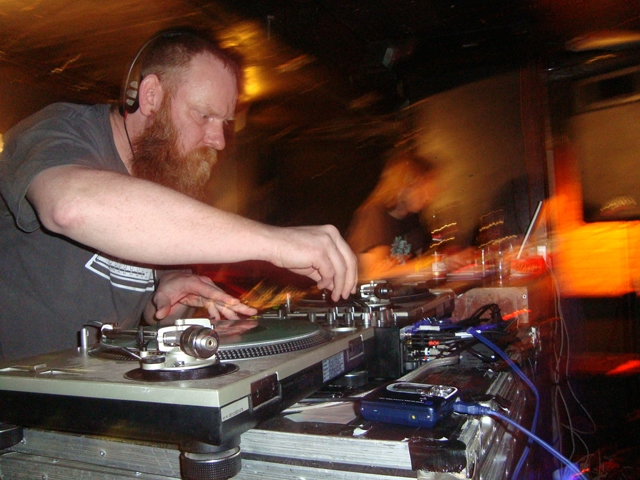
In 1987 I started my radio show and in 1994 I began DJ-ing on public events (in addition to my radio shows), mainly at experimental festivals in Den Bosch such as Earational and at events organized in De Melkfabriek. And then I just kept using the name DMDN. I started using 3 turntables and 2 CD players to create my own noise and soundscapes using sounds from other artists. Later I also started playing other music types for dancefloors like Speedcore, Jungle, Breakcore, Acid House, Dubstep etc.
So as a DJ I did countless of performances using DMDN as artist name.
How would you describe your sound?
For DMDN I often use the term Power Electronics, or just Noise. But there is also some kind of Ambient element, even though Ambient is often associated with something quiet. Most of my tracks also contain a structure that gradually develops as you hear in Ambient.
“Adrenaline and viciousness plays an important role in almost all the music I make”
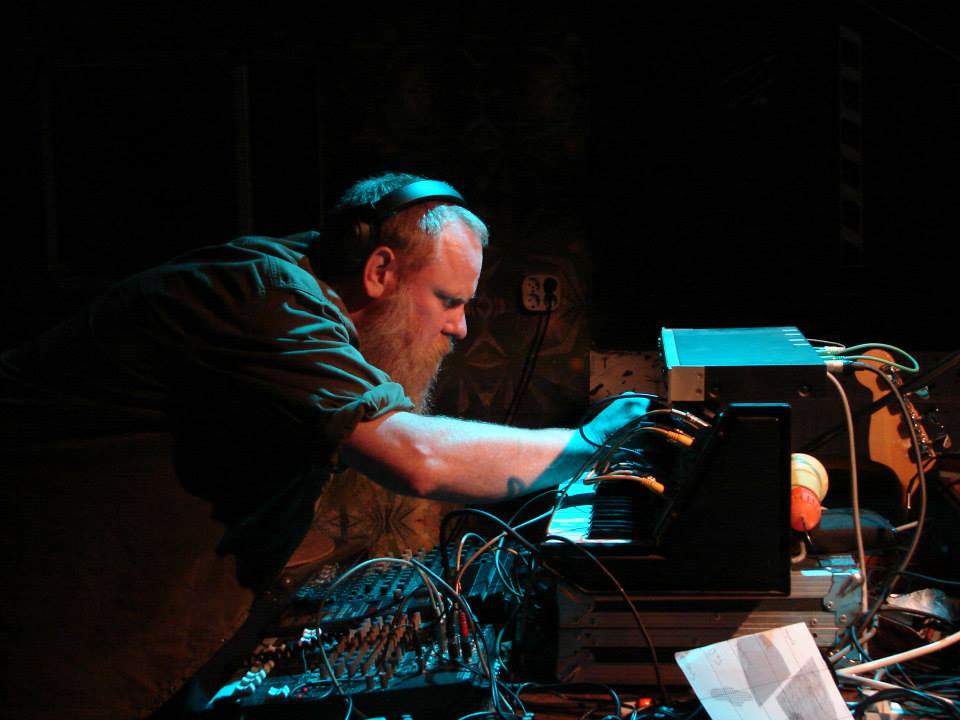
But in general, adrenaline and viciousness plays an important role in almost all the music I make (not counting THU20) and it has to have a sharp edge. My personal preference is mainly for extreme and loud music.
How important is improvisation for you?
Improvisation is very important to me. I am more of a person who picks up the instruments and just starts. I taught myself how to use a guitar and many things I made myself are made in the moment. I try to catch a flow and then exploit it further.
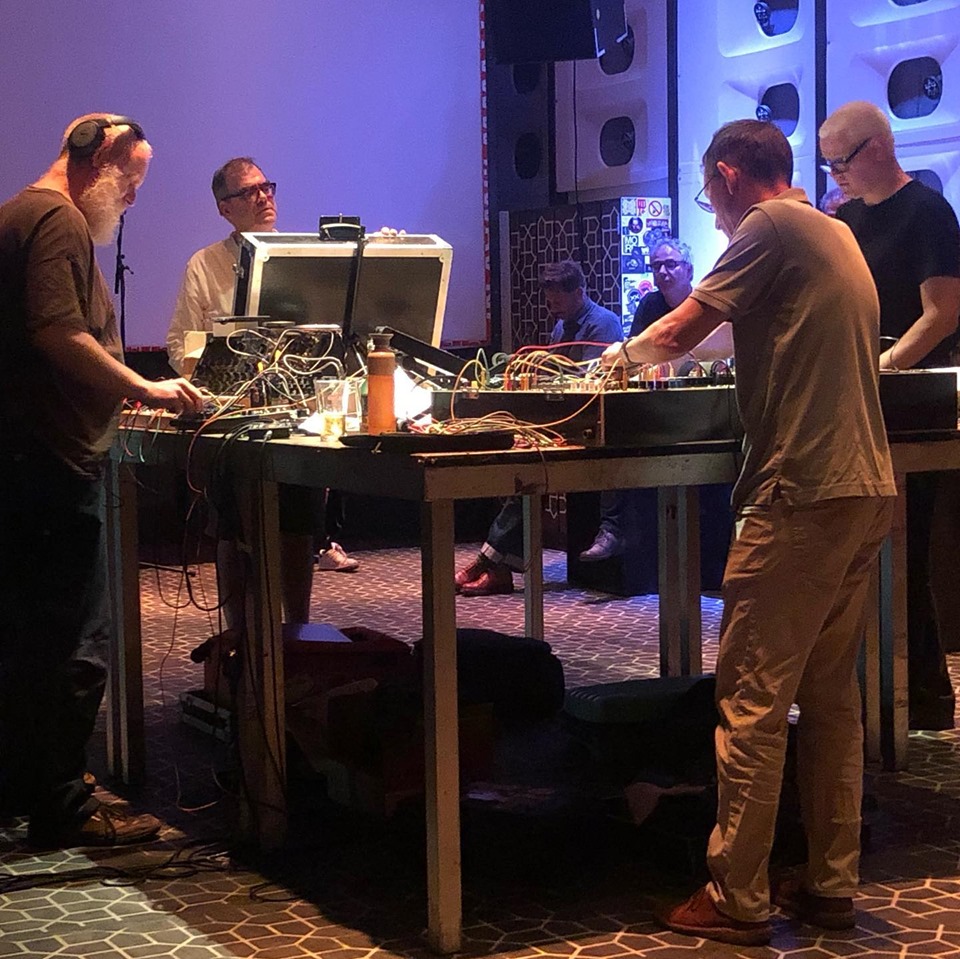
Technically I am a bad musician; I cannot read a single note and I don’t possess the “normal” playing techniques that most guitarists should know.
“The fact that everything took place underground and that you had to hunt for it yourself, was a great attraction for me.”
I would be delighted if you can take some time and reflect on underground tape culture in the Netherlands and abroad. What was it like to be part of the scene?
Ever since my first cassette purchase I have been forever captivated by the phenomenon of cassette culture. I looked for fanzines and stores where I could find information about cassette labels. The fact that everything took place underground and that you had to hunt for it yourself, was a great attraction for me. After all, there was no internet at the time.
In one of the magazine’s I read an advertisement in which the Dutch Cassette Catalog was offered. I immediately ordered it and at that time I got to know its publisher Frans de Waard. He is a very active networker and from the moment I bought his Cassette Catalog we have kept in close contact and the ball had started rolling …
Obviously it was a very exciting time. The release of cassettes was within reach. You did not have to invest large amounts of money to get started.
Of course you looked up to labels that could already afford a printed color cover, or that had entire run duplicated by cassette factories, but standard Sony cassettes with xeroxed covers were also sufficient.
“It was always exciting what would drop into your mailbox a few weeks later.”
I started corresponding with other labels and artists and often suggested swapping cassettes. Often you didn’t even know the music or had you ever heard of the artist in question, but it was always exciting what would drop into your mailbox a few weeks later.
You are in the middle of the scene and you have met a lot of people, so you come to the point that you are asked to perform at festivals with your band, etc.
In 1986 I moved from Asten to ‘s-Hertogenbosch (Den Bosch) and immediately started working as a volunteer at V2. In addition to regular activities during manifestations, I also started working at the V2_Archief. That was a cassette and magazine shop that belonged to the V2 artists’ collective where many manifestations were organized and many experimental bands performed. I didn’t pursue the policy there, but I often stood in the shop behind the counter, answered the mail, and often clipped and glued the covers of our publications together. I still remember the muscle pain in my arms from cutting, pasting and finishing all those Laibach and Test Department cassettes …
At the time there were a few cassette stores in the Netherlands: V2, Staalplaat, 2B (a simular place to V2 but located in Eindhoven) and Ding Dong. A number of cassette fairs were also organized and tapes were often sold at performances. There will undoubtedly have been several more places where cassettes were sold, I can remember that some record stores also had a number of tapes in the display case (often from bigger labels who managed to find a distributor, releasing luxurious releases that I could not afford at the time).
“For me the cassette culture was the true nature of subculture.”
The nice part of this cassette culture was that everyone was so dedicated and willing to trade releases and participate in compilations. You easily made music friends and musically everything was possible. Because you had to invest relatively little money, the threshold was also lower to exceed musical limits. That made it much more exciting for me. The unpolished in both the recordings and the cover design has always appealed to me. For me the cassette culture was the true nature of subculture.
The moment this all happened I experienced it as special, but on the other hand it seemed obvious. In retrospect, this cassette culture represents a very special era, in which globalization was still in its infancy. Nowadays, all the information you want to know about music can be found at the touch of a button on your computer keyboard. And the amount of music available is now so vast that everything seems replaceable. I know people who have 1000 GB of music in their computer without ever having time to listen to it.
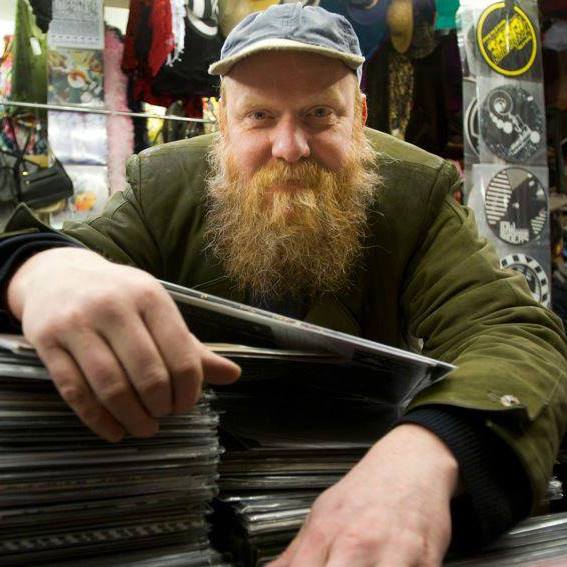
Back in the days, you had to dive right into it and put more effort into discovering what you were looking for. Every item you found was actually some kind of trophy. Those were certainly different times.
So what is the scene like in your city?
In 2002 I moved from ‘s-Hertogenbosch to the university city of Tilburg and it was a relatively small working-class town with a large subculture scene. The city already had a past with soundsystems that organized many illegal rave parties and had a number of good pop stages where there was also room for extreme metal and experiment.
In addition to the well-known Roadburn festival, we also had the fantastic Incubate festival. Many Breakcore and (Vatican Analog) Noise evenings were organized, there were still a number of squats and artists’ premises where one and the other was organized.
A pirate radio station on air (Radio Aktief which was later resurrected under the name Radio Raket). A vibrant underground scene, and Tilburg was well known for it.
In recent years, there has been a demolition by the local and national government. All laws and regulations are tightened more and more and a permission is needed for everything. Subsidies were cut off and all nice stages are now lumped together and lose their soul. On the stages where the good bands used to perform, artists are now booked for the general public. Unfortunately, this now applies to most cities in the Netherlands. Culture is now taken by the throat here. Tilburg is increasingly becoming a dead city in terms of underground culture.
You’re also owner of Antenne Record shop in Tilburg.
From the moment I started my own labels in 1982, I threw myself into the DIY market and started selling and swapping cassettes and records. In the early 90’s I had my Supreme Tool Supplies label and mailorder. In 2002 I moved in with my better half and he had a vintage clothing store since 1975 and there I started with a few boxes of vinyl. That has now grown into a full-fledged (vinyl only) record store specialized in electronic music. I mainly sell new vinyl, but also some second-hand. From Deep House to Experimental and Noise. So this store is the logical continuation of all the activities I started from a young age.
Are you still living the punk ‘DIY ethos’?
Absolutely. My interest is still in extreme artists who produce their own releases in small editions. I am still very susceptible to releases that radiate the DIY principle, preferably with a low budget look. What most people see as a well-cared-for product has less kudos to me. Way back I was immediately drawn to blank record sleeves with a vague xerox attached to it. That appeals to my imagination much more. And it has always remained that way until now.
You have a huge collection of tapes and records. Do you still go out and dig through piles of records these days? What are some of the latest finds?
That’s the nature of the beast. I will always keep hunting for new finds because I am a real collector. But I have to say that now that the supply of new music is so huge because of my record store, I also make less effort to hit the road. And most traders (and buyers) who are on fairs and markets know the prices nowadays. The things I’m really looking for are often not affordable and can only be found on Discogs or Ebay. For the rest I let myself be surprised when I am at a flea market or record fair.
I have a soft spot for flexidiscs with advertising on them, which were generally distributed from the mid-50s to the 1990s. They often show a beautiful image of the time in which people often still believe what the government or commercial brands say.
Nobody looks for those flexi’s so you’ll find them sometimes at flea markets and they’re fun.
What are some of the most interesting tapes/records in your collection?
That is difficult to say. The records and cassettes that mean the most to me are often releases from the period in which I discovered the DIY scene in the early 1980s. These are cassette releases on Dutch labels such as Ruziek, Lebel Period, Kaisettes, 6De Kolonne and ClicheBootlegRecordsTapes & Publicery etc and records & tapes released by ZSF, Come Organisation, Maurizio Bianchi, the first Fall and Swans records and more of these usual suspects.
Is there an album that has profoundly affected you more than others?
The album that opened up a whole new world for me was the compilation LP ‘Neuengamme’ released by Broken Flag in 1982. I came across this LP in a record store and was immediately attracted to the low budget cover. A faint black and white xerox of a dead body pasted on a blank cover, with only the names of the participating artists written with a rough typewriter font. I only knew Esplendor Geometrico from that, because I had once heard a track from them on Dutch radio. I bought the record without listening first and I was instantly sold. This was my first introduction to Noise and Industrial music.
Early albums of Swans, Crass, The Fall, Maurizio Bianchi, Whitehouse, Sonic Youth have also left a deep impression, but I can easily name many more ….
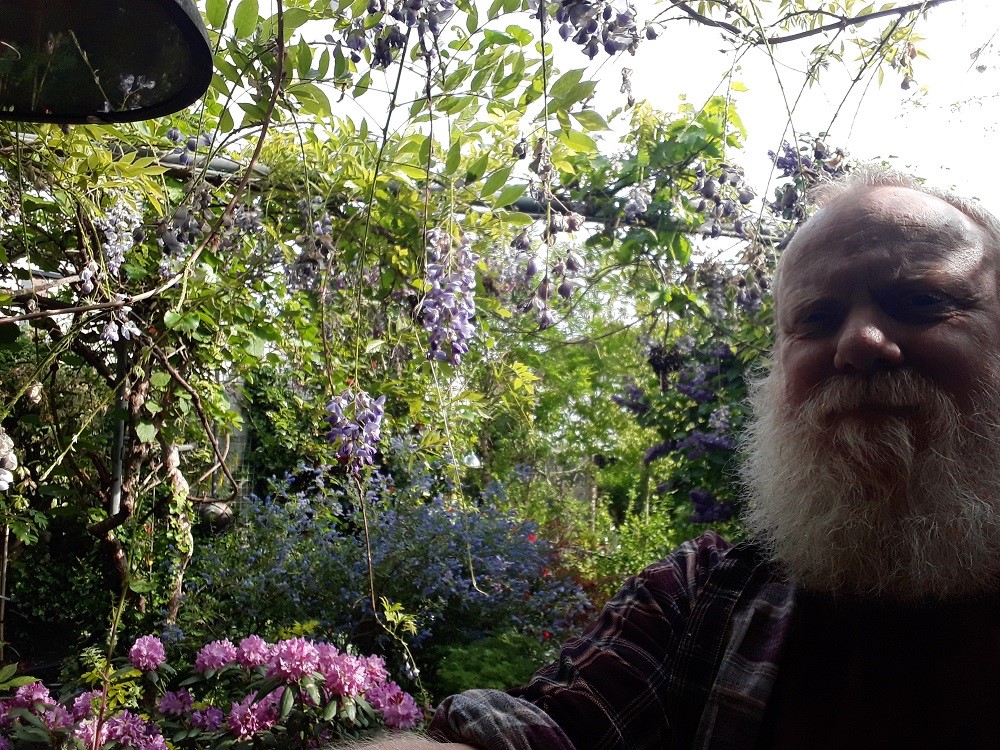
Let’s end this interview with some of your favourite albums. Have you found something new lately you would like to recommend to our readers?
I must honestly say that the older you get and the more you get into music, you are less and less surprised by new bands or releases. As far as new music is concerned, I currently listen most to Speedcore and new “old school” Jungle. Labels such as Cathartic Noize Experience and Amenology. Beautiful ambient records are currently being released on the Dauw label. I also listen to a lot of various dance styles, such as Acid, Tekno, Dark Techno and the like, but I notice that I most often revert to 80’s and 90’s Electronic Industrial, Experimental, Noise and Noise Rock. If I ever end up in an old people’s home and I have to sell my collection except for a small part, I think I will end my old day with a box of Experimental and Noise records.
Thank you. Last word is yours.
I think I’ve said pretty much everything…. Sjak van Bussel
Klemen Breznikar
Antenne Recordshop Official Website
Antenne Recordshop Facebook
Antenne Recordshop SoundCloud
Sam-Sam Facebook

